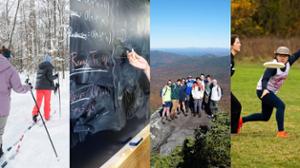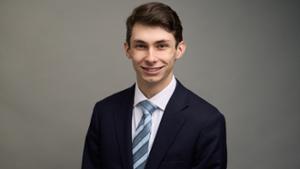
Joining 800 others from more than 20 countries, students chose from over 90 workshops ranging from inclusivity in wilderness and adventure programming to wilderness therapy as a field developing licensing and certification standards. They also took advantage of networking opportunities.
“Getting the opportunity to attend the AEE conference has expanded my view of what I thought was possible post-graduation,” Zach Weller ’23 said. “Before attending the conference, I had a narrow scope of what I thought outdoor and experiential education encompassed; now I see just how broad the field is.”
James followed the community engaged learning track, and five students joined Jillings at the one-day pre-conference “Outdoor Orientation Program Symposium” where, accompanied by Ben Oliver ’02, they presented to more than a dozen other colleges on how Hamilton selects its Adirondack Adventure trip leaders.
Maggie McDow ’23, who took part in the symposium, said, “I learned a lot about the ways that other programs work. I’m excited to think more about our program and how we can work to improve it with these new ideas in mind. It was so cool to be able to talk with directors of both long-standing and brand-new adventure programs.”
Another attendee, Asa Szegvari ’23, added: “Discussing the field of experiential education with people from beyond the Hamilton community emphasized both the areas where we are succeeding but also how we can continue to make our programs more accessible and inclusive.”
Experiential learning
Experiential learning can occur both in and out of the classroom, as well as on or off campus. It includes labs and performances, summer research and internships, community outreach programs and leadership institutes, among many other things.
Posted December 2, 2022


